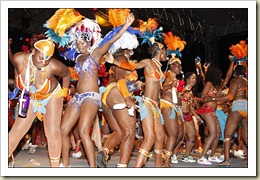Antigua Carnival
 Each year, from the last days of July to August, on the first Tuesday, Antigua is celebrating the Carnival through music and dance. The main day of the Carnival is called the j’ouvert. On this day steel and brass bands perform for the enchantment of the population.
Each year, from the last days of July to August, on the first Tuesday, Antigua is celebrating the Carnival through music and dance. The main day of the Carnival is called the j’ouvert. On this day steel and brass bands perform for the enchantment of the population.
The Carnival last for ten days and is a parade of beauty pageants, colorful costumes, talent shows and good music. There are even competitions between music style performers: the competitions of Calypsonians between the Calypso Monarch and the Party Monarch, the competition of Panorama steel band. There are beauty competitions such as Miss Antigua Pageant and the Caribbean Queen. Besides these major events, there are a great number of other smaller festivities which include parades, food fairs, local concerts and cultural shows.
The Carnival dates back to the 1st of August 1834, the day it was abolished slavery. The joy of the people was expressed openly, on the streets, by different celebrations. For many years the carnival was more of an informal event. In 1957, however, the population replaced the Old Time Christmas Festival with one inspired by a carnival in Trinidad. The modern Antiguan Carnival still keeps elements of the Old Christmas one.
From the Christmas Festival they kept the music and dance, mostly expressed in the iron bands and masquerades. As proof of the European influences, in the Christmas Festival as well as in the modern Carnival, there is the dance of the highland fling. The dancers wear Scottish kilts, bear cowhide whips and have wire made masks. Other dances are the John Bull, where dancers wear animal horns and banana leaves, the Moko Jumbie or Long Ghosts were stilt dancers wearing robes and they were accompanied by bass drums and kettle, triangle, fife and boompipe, a one meter long plumbing joint.
Calypso is the oldest music genre performed during the Carnival and it dates back to slavery period. It is thought to have been a form of communication between slaves who were forbidden to otherwise speak to each other in the fields.